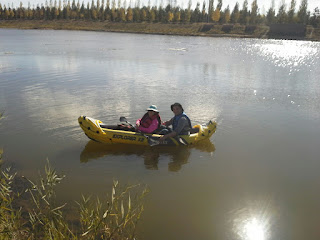 |
| View Over the Frozen Esil' River on March 20 |
But unlike the snows of February, this new snowfall will not last. Daytime temperatures hover near freezing now. Bare spots had begun appearing in the blanket of white before yesterday's March surprise, and for the first time this year, birds could be heard singing in the branches of the trees in Presidential Park. The Sun now warms the skin and is setting after 7pm in this land of perpetual daylight savings time.
Last week was the spring holiday of Nauryz. With the Embassy closed for three days plus a couple of days' leave, I rested without guilt for a full nine days. Winter here is tenacious and hard, and the coming months will bring long hours of work with the coming of the Astana Expo and other events that will bring many a Washington visitor. The week of Nauryz was a time to rest up and rest forward, a time for the first long walks of 2017.
With the coming of spring also comes the first hint that my time here will be ending. I arrived in Astana two and a half years ago today. I remember standing on my balcony sometime after midnight after my Embassy sponsor had dropped me at my new home. I looked out on the Akorda Presidential Palace and the Esil' River and wondered how I would survive three years in a new job in a city where I knew no one. "May these years go quickly," I thought.
Fast forward to last September 23. NN and I had just landed back in Astana after five weeks in the US. I felt conflicted. On the one hand I felt ready to call an end to the work career right then and there. I am tired, and my new home in Maine beckons. The policies of the new administration in Washington are at odds with my beliefs and values. All of this tells me it's time to go.
At the same time I never want to leave. I said to NN that day last September that for as long as there is ice and snow on the ground, my time on the frozen steppe is as eternal as the Astana winter.
And why, as tired and opposed to new Washington policies as I am, do I not want to leave? In part it's the knowledge that this will be the end of my overseas life, over a dozen years that have seen me living in Moscow, Tashkent, Bucharest, and now Astana, the fulfillment of a lifetime dream to live and work in countries where Russian is at least a second language. It will be the end of a time that freed me and let me at last live the life I was born to live. But more than anything else, I don't want to leave the people I have come to know and love. I have family here.
On that night in September 2014, my apartment seemed cold and empty, devoid of life and love. Now I joke that it's the young women's hostel of Astana. First there was NN whom I met in my first week. By December she was my official member of household living in my guest bedroom. Then there was UE, my dearest friend whom I came to trust in everything. I didn't even realize that at some level I, like many, was in love with him until he was taken from us far too soon, leaving me and dozens of others bereft and lost. I cried more than at any time since my Mom died ten years ago. The day UE and I paddled a kayak up the Esil' River with NN walking along on the embankment will always shine out as my best day in this country.
 |
| My Happiest Day in Kazakhstan |
Later, just one year ago, there came LT, my young soul sister who reminds me so much of myself at her age with the difference that she has an inner strength at her age that I did not. LT now shares the second bedroom with NN as we work to secure her future. I have linked my life and fortune to hers. And with LT there came her most wonderful Mom LO who could be a role model for us all in her acceptance and caring for her daughter. Together, NN, LT, LO, and I have created a family.
During Nauryz week we took long walks, shared lazy meals, and supported LT as she prepared for the TOEFL exam. When she took the exam last Saturday, we all went with her and were as nervous as she was.
That's why I don't want to leave. Astana has become home, and now the coming of spring reminds me that the time to go, still some five or six months distant, will come quickly.
But there is also hope. Before yesterday's snow, we had already seen the first light rain of this year. The waters of March and April are coming and bring a promise of joy and continuation. As it was with Bucharest, I have put down roots here that I will nurture and cherish in the years to come. I will be coming back. More than that, I am seeing to it that part of my Astana life goes with me and puts down roots in the US.
My last winter in Astana has ended, but the seedlings tended through the long winter will soon bear fruit. Spring, summer, and the future beckon. The love goes on.
* * * * * * * * * *
The Waters of March, written my Antonio Carlos Jobim and performed here by him with Elis Regina, is my favorite Brazilian song. "The waters of March close the season and bring the promise of life in your heart."







